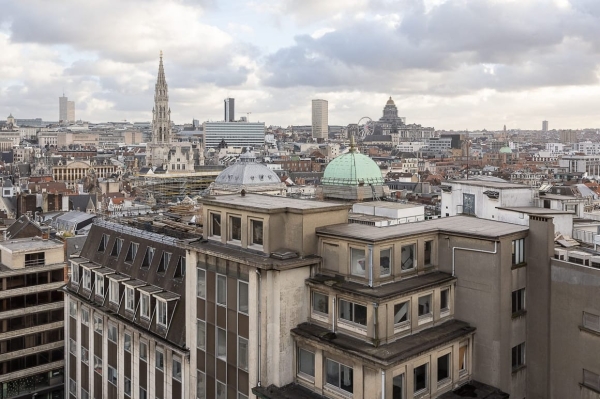Brussels’ big makeover: Green buildings, wider sidewalks and fewer parking spots
With its Good Living plan, the city wants to overhaul its gray image.
This article is part of POLITICO’s Global Policy Lab: Living Cities, a collaborative journalism project exploring the future of cities. Sign up here.
BRUSSELS — For years Brussels has lagged behind other European cities when it comes to quality of life.
While Paris, Vienna and Barcelona transformed their urban landscapes with new parks, sustainable housing projects and green superblock neighborhoods, Brussels maintained a somewhat unpolished image with its car-choked streets and concrete-heavy public spaces.
But the city now hopes to shed that image with a radical new urban scheme known as "Good Living." The city-building plan would make wider sidewalks, greener public spaces and sustainable buildings the norm across the Belgian capital, while prohibiting demolitions and progressively slashing on-street parking.
In an interview with POLITICO, Brussels Secretary of State for Urbanism Ans Persoons, who oversees the scheme, said it would ensure "quality of life, quality of public space [is] at the center of every project that is carried out in the city."
But getting the new rules approved won’t be easy.
The region’s left-leaning coalition government has less than six months left in its mandate and will need to overcome several legislative hurdles to lock in Good Living before elections in June.
The scheme also risks facing heavy blowback, given it touches on how people live, move and build new homes in the city. Many residents — car-users in particular — are still fuming over the government’s Good Move mobility plan aimed at keeping cars out of the city center.
If approved on time, the new rules could inflame social tensions just before people head to the polls.
Reclaiming the city
The Good Living plan aims to completely rewrite the capital’s city-building regulations, which date back to 2007 and are "totally outdated," according to Persoons.
Back then, "Brussels was very different demographically and we hadn’t dealt with things like the pandemic or extreme heat, issues we have to deal with today," she explained.
One of the signature proposals would see the width of sidewalks expanded from 1.2 meters — or less — to a minimum of 2 meters, creating space for more comfortable movement and allowing people with disabilities and parents with strollers to access the city more easily.
The plan also addresses climate change with new minimum requirements for trees and green spaces: At least 5 percent of narrow streets must be reserved for greenery, while wider thoroughfares have to set aside at least 15 percent of their surface for vegetation.
These measures means there will be less space for on-street parking — a dramatic prospect in a city that has seen violent protests held in reaction to the Good Move scheme to reduce traffic within the capital.
Despite the potential for backlash, Persoons said rethinking how roads and public spaces are used is a key part of the plan.
"Protecting the city from heat and extreme weather involves planting more trees and having more green space to absorb rainwater," she said, and rethinking urban movement "requires us to account not just for private cars, but also for public transport, cyclists and pedestrians."
The secretary of state added that she isn’t interested in "waging a war on cars," but rather in ensuring that "everyone has their space."
New rules for new buildings
The Good Living plan also aims to transform Brusseleirs’ homes.
The scheme would make it extremely difficult to tear down buildings — a process Persoons said is "terrible for the environment and comes at a huge energetic cost." Instead, developers will be obliged to look for ways to renovate or convert existing structures.
New buildings will have to be designed in a way that ensures they can be transformed from commercial to residential spaces if needed. And in a nod to safety concerns within the city, ground floors of buildings must have clear windows on the street-level to ensure there are fewer blind spots.
The plan requires flats in new residential buildings to have terraces of at least 2 square meters in size, and for every additional bedroom, the size of that terrace will have to be increased by an additional 2 square meters.
Meanwhile, the roofs of new buildings will have to provide more than just shelter: The spaces must either help retain rainwater, accommodate solar panels or be used as a terrace.
While most of the new regulations target new builds, the plan would also see the permitting processes for existing housing streamlined or eliminated altogether with the goal of making energy-efficient renovations less cumbersome. That’s something the city hopes will make it easier to meet upcoming EU rules that aim to dramatically improve the energy performance of buildings.
The Brussels region is currently on track to see the Good Living plan approved by June — but the process could be thrown off course by Belgium’s Council of State, which is tasked with checking new legislation has been developed correctly.
If the body were to find the city did not carry out enough public consultations, for example, the scheme would not be approved before the June elections, Persoons conceded. There’s no telling if Brussels’ next government would take the plan forward or shelve it.
"We’re hopeful that we’ll make it," said Persoons. "These changes are needed to meet new EU requirements, but they’re also needed to reinforce our right to enjoy good quality of life in the city ... Making the city greener, more inclusive, more accessible for everyone is something that benefits us all."






